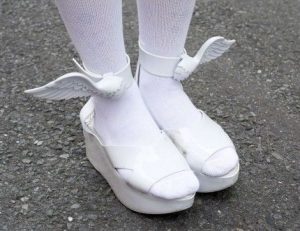
This is a shortened version of a post I published in September. It has a Christmas theme so it suits this time of year!
Here’s my favourite definition of empathy from the Oxford English Dictionary:
2. a. Psychology and Aesthetics. The quality or power of projecting one’s personality into or mentally identifying oneself with an object of contemplation, and so fully understanding or appreciating it. Now rare. (italics mine)
“Now rare” is meant, of course, to apply only to this particular definition of empathy, but I think these words can be taken as a larger comment on the existence of empathy in general. It is indeed rare.
A lack of empathy has been described as a failure of imagination, so one might expect novelists to be particularly good at empathy. A good novelist must be able to imagine what it’s like to be each of her characters, even the villains, at least enough to make them vivid and believable. As Rebecca Solnit explains, “empathy is first of all an act of imagination, a storyteller’s art, and then a way of traveling from here to there” (The Faraway Nearby).
I have a few tricks up my sleeve when I’m having difficulty understanding one of my characters. I sometimes write a transcript of an imaginary interview with them, asking as many intrusive, personal questions I can think of. One particularly sullen character refused to speak to me after only a few questions. Another yelled and cursed at me, then walked out. My latest interview with a new character ended with my staring at her blankly, not sure what to ask next. None of these felt like positive interactions at the time, but I often need to attempt multiple interviews before I make any real progress. For example, after several interviews (a few months apart) with the sullen character, she finally opened up and admitted that she appreciated all the hard work I’d done on her behalf!
These experiments and exercises are all well and good for fiction writers, but I’m sorry to say they don’t help me understand real people. My characters are like my children: I love them all and can’t really think of any of them as villains. Moreover, I’m the one giving them life, so even though they seem to take over their stories sometimes, I know I’m ultimately the one in control.
Not so with real people.
A while ago I tried writing a scene from the point of view of a real person I was angry with and was surprised how easy it was. I was the villain in this person’s story and had no problem writing that scene from his point of view. But later I realized that I still wasn’t feeling true empathy for this person: even though I put myself in the position of villain, I was still the one in control because I was writing the story.
Instead of the OED definition of empathy as a “quality or power,” I’ve begun to think of empathy as a gift. We can try our best to be empathetic, learning to listen well (an important skill that sometimes seems even rarer than empathy), using our imaginations to consider multiple possibilities for someone’s behaviour, but ultimately we are imprisoned in our own skin unless we are given the gift of insight, a rare glimpse inside someone else’s inner world.
One of these rare experiences happened to me when I was about ten or eleven. It was December and I was an angel in the school Christmas play. Having lost the coveted part of Mary to the prettiest girl in my class, I decided to be content with the head angel’s part (actually, there was no head angel—I just decided to believe this to make myself feel better). All the angels wore white robes (modified bed sheets) and sparkling haloes (two drooping tinsel circles joined by one vertical wire). To our family members and friends crowded into the hot auditorium who were no doubt feeling queasy and exhausted after long days of Christmas shopping, we probably looked pretty generic. Let’s face it—children in makeshift angel costumes at Christmas tend to look the same everywhere. We didn’t even sport the cardboard wings that angels at better schools did. (How I would have loved a pair of shoes like the ones in the photo above for the occasion!)
Along with the other angels, I stood behind the holy family: a Mary with perfect ringlets, a carbuncular Joseph, and a plastic baby Jesus. Nothing unusual happened until we began to sing “Angels We Have Heard on High.” I’ve always loved to sing, and that night I belted out my part loudly and with gusto. Then, as I beamed down at Mary and the baby, a strange thing happened. I was not just a child pretending to be an angel. I was an angel looking down at the real Mary and the real baby Jesus. I was there and I knew the incredible joy the angel felt upon seeing this scene in real life more than two thousand years ago.
I remember trying to explain the experience afterwards to my patient but puzzled parents. As an adult I can’t explain it, so how could I have done so as a child? Even as I write this I’m fighting the temptation to add qualifiers, disclaimers, and explanations with the patronizing attitude adults often have with children, even with our own child selves.
All I know is this: I was a real angel for a few minutes that night, and I had done nothing to become one except do my best with the role I was given. Maybe that’s a necessary condition for empathy.
Merry Christmas and all the best for 2015!